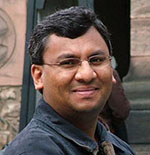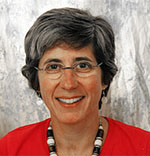
|
Subramanian Ramamoorthy
School of Informatics
The University of Edinburgh
Website
|
Ad Hoc Human-Machine Interaction: A Categorization-based Approach
Abstract:
Agents that must interact with others, especially when the others are human co-workers, must learn to coordinate with the unknown, quickly and robustly despite substantial variability in plans and strategies. The intractability of this problem is often alleviated by categorisation, wherein the agent conceptualises the domain in terms of abstractions, enabling a general class of practicable algorithms.
Motivated thus, I will present the Harsanyi-Bellman Ad Hoc Coordination (HBA) model and algorithm that combines Harsanyi's concept of types in Bayesian games with Bellman's concept of optimal control. I will briefly outline some ways in which policy types can be defined in principled ways, extracted from data through unsupervised learning and sometimes provided by human experts as weak and imperfect domain knowledge. In a genuinely unknown interaction, all of these are error-prone in that the hypothesised model is unlikely to exactly match the behaviour of other agents in a novel task instance. I will present some analytical results that characterise the performance of the HBA algorithm under these conditions of mis-specification. If time permits, I will also present some results from human subject experiments involving the HBA algorithm.

|
Peter Stone
Co-chair of AAAI-14
Department of Computer Science
The University of Texas at Austin
Website
|
Ad Hoc Autonomous Agent Teams: Collaboration without Pre-Coordination
Abstract:
As autonomous agents proliferate in the real world, both in software and robotic settings, they will increasingly need to band together for cooperative activities with previously unfamiliar teammates. In such "ad hoc" team settings, team strategies cannot be developed a priori. Rather, an agent must be prepared to cooperate with many types of teammates: it must collaborate without pre-coordination. This talk considers ad hoc teamwork from both a game theoretical and empirical perspectives.

|
Manuela Veloso
President of AAAI
Computer Science Department
Carnegie Mellon University
Website
|
Synergy Graphs to Train and Form Ad-Hoc Teams
Abstract:
Synergy Graphs were introduced by Liemhetcharat's PhD thesis to effectively capture the fact that agents perform tasks with other agents, not only based on their individual capabilities at the task, but also on their level of connection with other agents. The talk will review the contribution in terms of the representation and team formation algorithm. More recent work to be submitted for full publication, will be presented on improving a team by explicitly choosing which agents to train based on their synergy graph. As a workshop talk, comments and questions from the experts will be greatly appreciated and beneficial.





